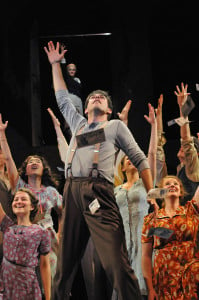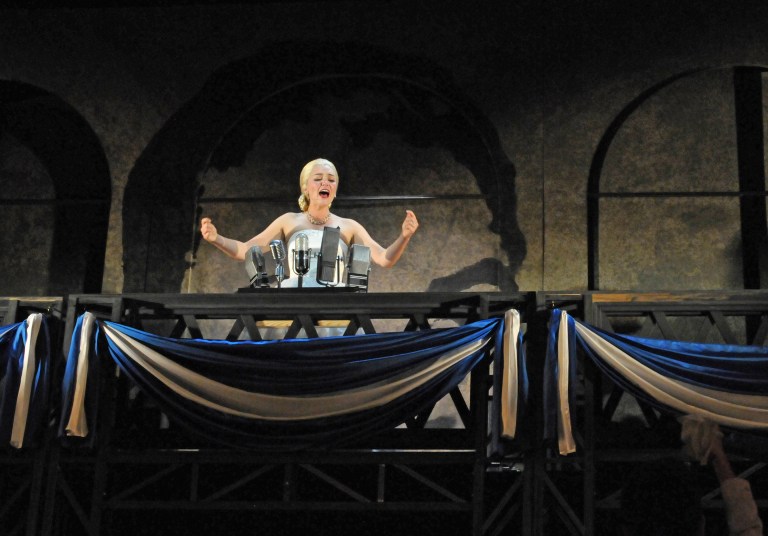As the lights come up on the stage of Memorial Auditorium, the audience sees powerhouse Eva Perón, played by Amy DuBose ‘15, in a position of vulnerability for perhaps the first time in her life. Laying in a hospital bed, “the spiritual leader of a nation” passes away due to cancer, soon to be mourned by grieving masses. However, did she deserve this incredible outpouring of grief? TAPS’ innovative production of the musical “Evita” explores this ambitious, controversial and influential leader and her impact on Argentina.
The events in the opening scene, depicting Eva’s funeral extravaganza, may have occurred after those in the rest of the musical, but they still set the scene for what is to come. A large video screen with actual footage from Eva Perón’s funeral adds an interesting visual element, but as the screen is not used for the rest of the production, this choice seems a bit random and unnecessary. Cynical narrator Ché (Matthew Billman ‘15, who energetically commands the stage) mocks the grand proceedings, as Evita was a complex figure who hurt a lot of people and made many of enemies during her life. However, TAPS’ production sets itself apart from other productions of “Evita” by implementing the character of Santa Evita (Mady Weiss ‘18), a spirit version of Evita who upholds female power by defending her choices against the male critic.
After giving a taste of what Eva Perón was all about, the musical rewinds to her youth, when she was a talented and ambitious girl looking to find fame and fortune. A giant watermark portrait of Evita that forms the set opens into six windows, in which the cast hangs laundry, truly creating the atmosphere of small town life in Argentina. Throughout the play, the same set becomes a podium in Buenos Aires from which Eva and her husband, Juan Perón (a powerful Ian Anstee ‘18), advance their political agenda to the masses of Argentina. Witnessing Evita’s journey from a young actress who sleeps her way up the social ladder to a political leader who impacts millions of people’s lives is a fascinating way to understand the importance of ambition in a cutthroat world, especially as a woman in a male-dominated society. Eva Perón was a powerful force herself, outside of Juan’s influence.

DuBose, a stunning singer with a strong stage presence, forms the centerpiece of an intricate ensemble cast. Dressed in clothes from the 1940s period, including suits and floral dresses past the knees, the ensemble shifts roles throughout the musical, portraying the public of Argentina, Perón’s wealthy peers and Evita’s team of stylists. Each time, they have a different attitude depending on their roles, but their energy keeps driving the show forward. The music in the show — Latin with some interesting infusions of rock — is heavy on the horns and drums, highlighting the drama of the story.
The musical, while soap opera-esque at times, is a powerful depiction of the life of a driving force in Argentina and the world at large whose influence continues to this day. Ultimately, Eva Perón’s spirit was much stronger than the body that betrayed her. “Evita” is a spectacle and feast for the senses, but provides a reminder of the importance and limits of ambition, as well as our own humanity.
“Evita” is running on the Memorial Auditorium mainstage from May 28-30.
Contact Madeline at mmacleod ‘at’ stanford.edu.
